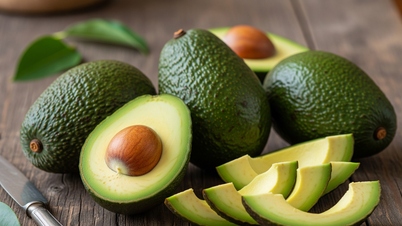By reducing the amount of saturated fat in your diet, you can lower your bad cholesterol levels by up to 20%, protecting your heart health.
The holiday season can be a lot of fun, but it can also wreak havoc on your heart health. In fact, research shows that bad cholesterol levels spike the most during this time of year — by nearly 20%.
Unhealthy foods and drinks, combined with stress from shopping, traveling, or attending parties, can leave you with less time to eat and exercise. All of this combined can negatively impact your heart, through the levels of two types of cholesterol in your body.
LDL (low-density lipoprotein) cholesterol, often called “bad” cholesterol, makes up most of the cholesterol in the body. High LDL levels increase the risk of heart disease and stroke.
According to Norman Lepor, a cardiologist in California (USA), cholesterol travels in the arteries and veins, enters the blood vessel walls and forms plaque.
"This process of 'rusting' the arteries makes you susceptible to a heart attack if it's in the coronary arteries. Or if the cholesterol is in the carotid circulation, it can cause you to have a stroke," Lepor explains.
People with LDL cholesterol above 100 milligrams per deciliter have high cholesterol.
Meanwhile, HDL (high-density lipoprotein) cholesterol, considered the “good” cholesterol, absorbs cholesterol in the blood, returns it to the liver, and then removes it from the body. High HDL cholesterol levels can reduce the risk of heart disease and stroke.
Additionally, triglycerides, a type of fat in the blood used for energy, play an important role in heart health. The combination of high triglyceride levels with low HDL and/or high LDL cholesterol levels can increase the risk of heart attack.
"High triglycerides can lead to inflammation in the artery walls, making plaque more likely to form over time," says Amy Pierce, a nurse and clinical lipid specialist at Norton Heart and Vascular Institute (USA).
About 15 to 20% of cholesterol levels are influenced by lifestyle habits such as diet and exercise, while 85% of cholesterol is made in the liver and is under genetic control.
"High cholesterol is largely genetic. While diet and exercise are important and can help treat many conditions, cholesterol is very difficult to control with diet and exercise alone," says Pierce.
The good news is that by reducing saturated fat in the diet and exercising regularly, including at least 30-45 minutes of aerobic and weight-bearing exercise, 4-5 times per week, LDL cholesterol levels can be reduced by up to 10-20%.
Pierce recommends consuming the following to help lower cholesterol levels:
- Soluble fiber (like that found in Metamucil, Cheerios, and oatmeal) - helps lower cholesterol by up to 10%.
- Foods containing plant sterols and stanols, combined with a balanced diet
- Some oils and butters - increase good cholesterol, reduce bad cholesterol to a minimum
- Nuts provide a good source of fiber and contain good fats: also help increase good cholesterol and reduce bad cholesterol.
Additionally, Pierce recommends limiting foods high in sugar and carbohydrates to lower triglyceride levels.
Meanwhile, Lepor recommends the Mediterranean diet, which is low in saturated fat. It is also endorsed by the American Heart Association (AHA), because it contains elements of the diet recommended by the AHA:
- Vegetables, fruits, whole grains, beans.
- Low-fat or fat-free dairy products, fish, poultry, non-tropical vegetable oils, and nuts.
- Low in added sugars, sugary drinks, sodium, processed foods, refined carbohydrates, saturated fats, and fatty or processed meats.
Khanh Linh (According to Healthline )
Source link


![[Photo] Prime Minister Pham Minh Chinh chairs the first meeting of the Central Steering Committee on housing policy and real estate market](https://vphoto.vietnam.vn/thumb/1200x675/vietnam/resource/IMAGE/2025/9/22/c0f42b88c6284975b4bcfcf5b17656e7)


























![[Photo] General Secretary To Lam presents the First Class Labor Medal to the Vietnam National Energy and Industry Group](https://vphoto.vietnam.vn/thumb/1200x675/vietnam/resource/IMAGE/2025/9/21/0ad2d50e1c274a55a3736500c5f262e5)































































Comment (0)